HIGHLIGHTS
Offer Details
- All-Equity Offer
- Swap Rate: 1 AGL Share received in exchange for every 4.8 PHL Shares
Key Dates
- Commencement Date: June 17, 2025
- Expected Closing Date: July 21, 2025
- Settlement of AGL Shares: July 31, 2025
- Incremental Cash Payment: July 31, 2025
PHL Shareholder Considerations
- Changes in cash flow characteristics/investment returns
- Evolving Business Risk Profile and Diversification
- Changes in Liquidity and Market Turnover dynamics
This week we at Bourse review a topic at the forefront of investors’ minds in recent weeks; Agostini Limited’s (AGL) takeover bid for Prestige Holdings Limited (PHL) (the Offer). With common ownership and consistent with AGL’s ‘growth through acquisition’ strategy, the pursuit of PHL would not appear out of the ordinary. PHL shareholders would naturally be pondering the potential benefits of accepting such the Offer and becoming shareholders in AGL, a stock which offers notably different characteristics and business risks. Could the AGL bid benefit PHL shareholders? We discuss below.
Offer Details and Key Dates
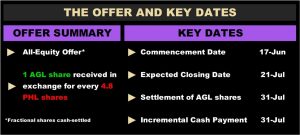
Agostini Limited (AGL) launched a takeover bid to acquire 100% of Prestige Holdings Limited (PHL) with an all-equity or share-swap offer. Shareholders of PHL are being offered 1.0 AGL share for every 4.8 PHL shares owned. Note: At prevailing prices prior to the Offer this would represent an approximate 26.5% premium in equivalent value to PHL shareholders (PHL share price of $10.95 x 4.8 = $52.56, vs AGL share price of $66.49). If successful, AGL intends to delist PHL from the Trinidad and Tobago Stock Exchange (TTSE).
Key dates surrounding the Offer include:
- Commencement Date: June 17, 2025
- Expected Closing Date: July 21, 2025
- Settlement of AGL Shares: July 31, 2025
- Incremental cash payments: July 31, 2025. (The exact timing for when these cash payments appear in shareholders’ bank accounts may differ depending on their respective financial institutions.)
If AGL acquires over 90% of PHL, it would have the legal right to compulsorily acquire the remaining shares under the Companies Act with minority shareholders being offered the same terms.
Shareholding Structure and Market Capitalization
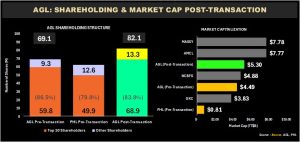
A closer look at the outstanding shares of both companies reveals that both PHL and AGL’s top 10 shareholders account for more than 75% of total ownership (AGL: 86.5%, PHL: 79.8%). Following the 100% acquisition of PHL, Agostini’s issued share capital would increase from 69.1M to 82.1M shares, reflecting the issuance of new shares to PHL shareholders. AGL’s top 10 shareholders post-transaction would increase from 59.8M shares to 68.9M shares, with top 10 ownership now accounting for 83.8% of total issued shares. Meanwhile, shares held by other (public and institutional) shareholders will increase from 9.3M to 13.3M, improving AGL’s relative public float and potentially enhancing trading activity over time.
In terms of market capitalization, based on current market prices AGL market capitalization post-transaction would amount to approximately $5.30B. In terms of relative size this would put AGL on par with some of the larger companies listed on the Trinidad & Tobago Stock Exchange (TTSE). For example, Massy Holdings Limited (MASSY) and Ansa McAL Limited (AMCL) both have market capitalizations of approximately $7.8B. This reflects the group’s enhanced scale, positioning, and relevance within the local equity market.
Should PHL Shareholders accept the Offer?
Each investor’s situation is unique and should be considered individually. However, three key considerations should come to mind in evaluating the Offer, namely (i) changes in cash flow characteristics/investment returns, (ii) changes in business risk exposure and (iii) changes in potential market liquidity.
Changes in cash flow characteristics/investment returns
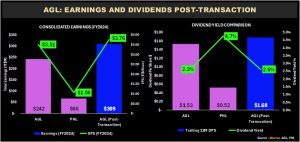
Based on FY2024 reported financials for both companies, on a consolidated basis: Total earnings would amount to TT$309M up from $242M for AGL alone and $66M for PHL. This translates to post-transaction earnings per share (EPS) of $3.76.
Post-transaction and utilizing PHL’s and AGL’s trailing 12-month dividend payments, the post-transaction dividends per share of AGL could be approximately $1.68, or a dividend yield of 2.6%.
PHL has traditionally appealed to more income-oriented investors due to its consistent dividend payouts and relatively attractive dividend yields. This is in contrast to AGL’s lower dividend yield, with greater potential for appreciation in share price given its growth strategy.
Evolving Business Risk Profile and Diversification
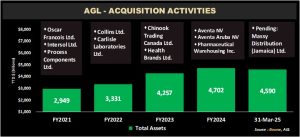
PHL operates exclusively in the quick service restaurant segment, growing primarily through brand and store expansion (Starbucks, KFC, Subway etc.) In contrast, AGL focuses on acquisition-led regional expansion across Pharmaceuticals, Fast Moving Consumer Goods (FMCG), and Energy and Industrial holdings.
As a result of these strategic acquisitions, AGL’s total assets grew steadily from TT$2.95B in FY2021 to TT$4.70B in FY2024, a 55% increase, reflecting the company’s focus on inorganic growth to strengthen its regional footprint and diversify its operations.
With successful integration, the merged entity could benefit from cost savings through better supply deals, and stronger overall growth by combining its strengths with Prestige’s well-known brands.
For PHL shareholders, the risk profile of AGL would be more diversified – spanning several sectors- with growth less dependent on organic sources and likely more acquisition-led.
Liquidity (Market Turnover)
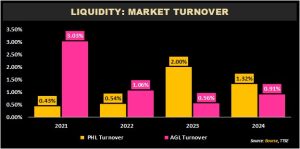
PHL shareholders might also consider the relative liquidity of AGL shares versus PHL shares historically, which could impact on a strategy of accepting the Offer and subsequently selling AGL shares. It should be noted that, despite some periods of elevated activity, both PHL and AGL exhibited relatively low market turnover. This, however, is commonplace in what is generally a thinly-traded local stock market.
Taking a look at the traded volumes of PHL and AGL over the past four years – in 2021 and 2022, AGL demonstrated significantly higher market turnover compared to PHL, indicating a more active trading environment for AGL during those periods. Specifically, AGL’s turnover was 3.0% in 2021 and 1.1% in 2022, while PHL’s turnover remained below 1.0% in both years. AGL’s liquidity, as measured by turnover, moderated in recent years (2023 and 2024), while PHL saw an increase in its market activity during the latter period. For 2024 PHL showed a turnover rate of 1.3%, while AGL stood at 0.9%.
Deal, or No Deal?
Having considered the above factors, should PHL shareholders accept the Offer put on the table by AGL?
Ultimately, PHL shareholders should first determine whether they want to become shareholders in AGL. If the answer to this question is “yes”, accepting the Offer as a PHL shareholder – particularly if you owned PHL prior to the announcement – would provide a compelling value point at which to effectively ‘purchase’ AGL shares ($52.56 vs. the then AGL market price of $66.49 pre-Offer).
If becoming an AGL shareholder does not appeal to you, accepting the Offer could still be the most value-enhancing course of action. PHL shareholders, who might be more interested in generous dividend yields or other types of business/asset risk exposure, could accept the Offer and subsequently sell their newly acquired holdings of AGL. Thereafter, they could reallocate these resources into other more suitable investments. In doing so, they would realize a healthy gain on the implied value of their PHL shares (relative to pre-Offer prices).
Importantly, in a scenario where less than 90% of PHL shareholders accept the Offer, AGL would not be bound to continue with the transaction. Under these circumstances, PHL and AGL share prices could potentially revert to pre-Offer prices.
As always, investors are encouraged to consult a trusted investment adviser such as Bourse to make the most informed investment decisions.
This document has been prepared by Bourse Securities Limited, (“Bourse”), for information purposes only. The production of this publication is not to in any way establish an offer or solicit for the subscription, purchase or sale of any of the securities stated herein to US persons or to contradict any laws of jurisdictions which would interpret our research to be an offer. Any trade in securities recommended herein is done subject to the fact that Bourse, its subsidiaries and/or affiliates have or may have specific or potential conflicts of interest in respect of the security or the issuer of the security, including those arising from (i) trading or dealing in certain securities and acting as an investment advisor; (ii) holding of securities of the issuer as beneficial owner; (iii) having benefitted, benefitting or to benefit from compensation arrangements; (iv) acting as underwriter in any distribution of securities of the issuer in the three years immediately preceding this document; or (v) having direct or indirect financial or other interest in the security or the issuer of the security. Investors are advised accordingly. Neither Bourse nor any of its subsidiaries, affiliates directors, officers, employees, representatives or agents, accepts any liability whatsoever for any direct, indirect or consequential losses arising from the use of this document or its contents or reliance on the information contained herein. Bourse does not guarantee the accuracy or completeness of the information in this document, which may have been obtained from or is based upon trade and statistical services or other third-party sources. The information in this document is not intended to predict actual results and no assurances are given with respect thereto.”
